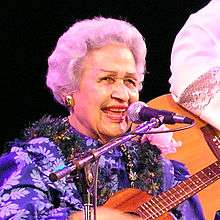Genoa Keawe
| 'Aunty' Genoa Keawe | |
|---|---|
 | |
| Background information | |
| Birth name | Genoa Leilani Adolpho |
| Born | October 31, 1918 |
| Origin | Honolulu, Hawaii, USA |
| Died | February 25, 2008 (aged 89) |
| Genres |
Hawaiian Music Easy Listening Pop |
| Occupation(s) | Musician |
| Instruments | Ukulele, Vocals |
‘Aunty’ Genoa Leilani Adolpho Keawe-Aiko (October 31, 1918 – February 25, 2008) was a Hawaiian musician.[1] Aunty Genoa was born on the island of Oʻahu in the Kakaʻako district of Honolulu and grew up in Lā'ie.[2] She was an icon in Hawaiian music and a mainstay on the Hawaiian music scene for more than 60 years. With her tremendous voice she captivated audiences, kamaʻāina (locals) and malihini (visitors) alike. With a tremendous repertoire of traditional Hawaiian standards and Hapa Haole tunes, she was without equal. Many local artists include Aunty Genoa Keawe among their many influences.
In 2005, she received an honorary doctorate (Doctor of Humane Letters) from the University of Hawai‘i.[2][3]
Early life
Genoa Leilani Adolpho's early years were full of moving about. She was born in 1918 in Kakaʻako in a stable. In her childhood her family moved about several occasions. Before she was ten years old she'd already lived on Kauaʻi for several years and had moved back to Kakaʻako. By the time she was about 10 years old, her family had moved to Laʻie.
This move to Laʻie would help facilitate the phenomenal music career that would highlight her life. Aunty Genoa always loved to sing ever since she was a little girl. In Laʻie she received her early musical training as a member of a local LDS Church choir. It was in choir that she built up her repertoire, knowledge and appreciation of music. She attended school until the 8th grade. She and her husband, the late Edward Puniwai Keawe-Aiko, whom she married in 1935, had twelve children.[2]
Keawe was a lifelong member of The Church of Jesus Christ of Latter-day Saints.[4]
Career
She began performing music professionally prior to World War II at officers' clubs and at bandstand shows in Kailua. Eventually Aunty Genoa landed a radio show on KULA singing with John Kameaaloha Almeida. Much like most other musicians, Aunty Genoa could not make a living solely on music. She also made money in her early years as a lei seller and as a taxi driver.
Her long and illustrious musical career had taken her throughout the islands and around the world. She had played at luʻaus, lounges, bars, and on numerous radio and television shows.
Aunty Genoa had taken great pride in preserving "na mea Hawaiʻi". She learned to speak Hawaiian through her mother-in-law, who spoke Hawaiian as her first language, and became a fluent native-speaker (the term for someone who has learned Hawaiian from someone who speaks it as their first language instead of learning it in school). She arguably has perhaps the widest repertoire of traditional Hawaiian meles. Like many old-time Hawaiian singers and musicians she plays her music by ear.
She had been recording music professionally since 1946. Her original record label was with the 49th State Hawaii record company. She then went on to record with Hula Records. After a falling out with the company she founded her own record label, Genoa Keawe Records, to record her music and the music of her family and friends. Along with the band, who had often been known as Aunty Genoa's Hawaiians, she helped to perpetuate Hawaiian music.[5]
Death
Following years of health complications, Genoa Keawe, died in the morning of February 25, 2008, at the age of 89.[4]
References
- ↑ "Entertainer Aunty Genoa Keawe dies - Pacific Business News". Pacific Business News. Retrieved 2016-06-18.
- 1 2 3 Lynn Cook (October–November 2007). "The High Life". Hana Hou! Vol. 10 No. 5.
- ↑ "September 2005 Campus News from the University of Hawaii 10-campus System :: Malamalama, the magazine of the University of Hawaii system". www.hawaii.edu. Retrieved 2016-06-18.
- 1 2 "LDS in Hawaii lose music icon, Aunty Genoa Leilani Keawe". DeseretNews.com. 2008-02-26. Retrieved 2016-06-18.
- ↑ Star-Bulletin, Honolulu. "starbulletin.com | Features | /2007/10/29/". archives.starbulletin.com. Retrieved 2016-06-18.
Further Reading
- Burl Burlingame and Robert K. Kasher. Da Kine Sound: Conversations With the People Who Create Hawaiian Music. Booklines Hawaii Ltd. 1978. Paperback: ISBN 0-916630-08-0, ISBN 978-0-916630-08-9. ASIN 0916630080.
External links
- "The Hawaiian Concert Guide (search for Genoa Keawe)". The Hawaiian Concert Guide. Orange, CA, USA: Hawaiian Concert Guide Internet Radio Show. Retrieved 2013-03-19. -